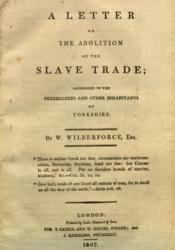Historical Event: The Slave Trade Act of 1807
The Slave Trade Act passed in Britain in 1807 did not abolish slavery in Britain or the United States. However, the Act represented a shift in the attitude of the British Parliament. After nearly two centuries of laws supporting and upholding the slave trade, Parliament was now taking a firmer abolitionist stance. The road to changing Parliament’s mind on the issue of slavery was a long one, and it did not end with this Act.
Two months before the Act finally passed, Willian Wilberforce, a well-known British abolitionist, penned a lengthy letter refuting arguments for the slave trade and amassing all of his evidence against it. One of the biggest things Wilberforce and the other abolitionists were fighting against was stigma. Slavery had been upheld on the back of racist ideas about black people being subhuman and inferior. Wilberforce quotes much of the derogatory, racist vitriol spewed against Africans at the time, and then goes to great lengths to refute those ideas.
Speaking of the horrific practice of whipping slaves for any small infraction, he says, “Let me but ask, what must be the effect necessarily produced on the mind from having been habituated to such scenes as these from early infancy?” (Wilberforce). The ideas of generational trauma and posttraumatic stress disorder may not have yet been in the lexicon, but that is exactly what Wilberforce is recognizing and pointing out within slave populations.
Today, research has shown that “trauma spans multiple generations, such that contemporary members of the affected group may experience trauma-related symptoms without having been present for the past traumatic event” (Fairfax). This “trauma and anti-Blackness are rooted in institutional economic, political, and social institutions that have had indelible generational impact” (Fairfax). While slavery now feels distant to many people, its effects continue to ripple throughout the entire world in the form of continued systemic racism and generational trauma.
One industry still seeing those rippling racist effects is the film industry, and the Academy Awards are no exception. One has only to look at the different responses to harm done by actors of different races, as other exhibits in this timeline have pointed out, to see this is true. Donna Murch, talking about the film industry, notes that, “Issues of stereotype and racial myth reside in this domain” (Murch). The stereotypes played out on screen reinforce old racist “stereotypical perceptions linking race and crime,” and because of this, “Mass media has played a crucial role in the maintenance and perpetuation of racial myth” (Murch). The media’s circus-like coverage of the Will Smith/Chris Rock slap makes a spectacle out of black pain and serves to reinforce those old notions about race and violence.
Just like the passing of the Slave Trade Act did not immediately lead to abolition throughout the British Empire, change in the film industry and media at large is slow to come. Like Wilberforce, we must still strive to dismantle the old prejudices from our society and work towards a collective healing of the ongoing trauma and stigma.
Works Cited:
Fairfax, Colita Nichols. “The Need To Be: Since 1619, Trauma and Anti-Blackness.” Phylon (1960-), vol. 57, no. 1, 2020, pp. 56–75, https://www.jstor.org/stable/26924987. Accessed 29 Apr. 2022.
Murch, Donna. “The Prison of Popular Culture: Rethinking the Seventy-Fourth Annual Academy Awards.” The Black Scholar, vol. 33, no. 1, 2003, pp. 25–32, http://www.jstor.org/stable/41069010. Accessed 29 Apr. 2022.
Wilberforce, William. A Letter on the Abolition of the Slave Trade. London, 1807. https://www.gutenberg.org/files/63974/63974-h/63974-h.htm. Accessed 28 Apr. 2022.
Related Links:

